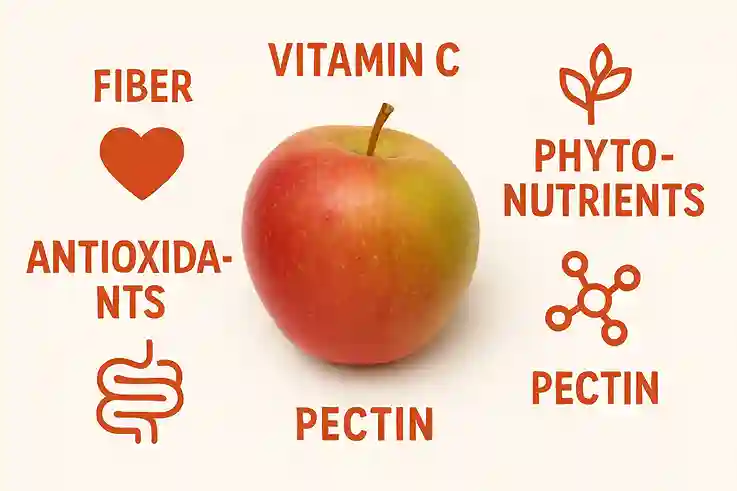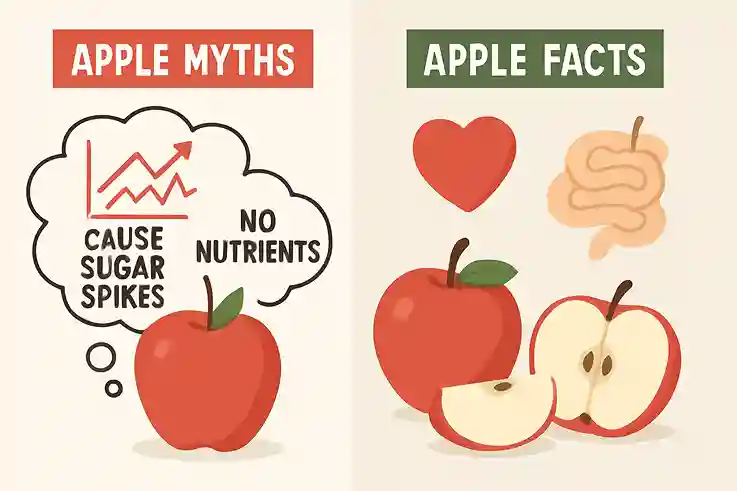Eating Apples: Health Boost or Just a Myth?
Apples and health benefits have long been linked in popular culture and nutrition advice. You’ve likely heard the saying, “An apple a day keeps the doctor away.” But is there real science behind it, or is it just a catchy phrase?
Today, more people are questioning everyday food beliefs. With so many claims about superfoods and wellness trends, it’s important to separate fact from fiction. Apples are often praised for their fiber, antioxidants, and convenience. But do they actually deliver measurable health improvements?
In this article, we’ll examine what research says about apples. We’ll explore their nutritional value, potential disease-fighting properties, and whether daily consumption truly impacts your health. Let’s uncover whether apples are a natural health booster—or simply a tasty myth.
The Nutritional Power of Apples

Apples are more than just a delicious snack — they’re a nutritional powerhouse packed with a variety of essential nutrients that support overall health and well-being. Let’s take a closer look at some of the key components that make apples such a beneficial addition to your diet.
Fiber
One medium-sized apple contains about 4 grams of dietary fiber, which is roughly 14% of the recommended daily intake for adults. This fiber plays a crucial role in maintaining digestive health by promoting regular bowel movements and preventing constipation. It also helps support a healthy gut microbiome, which is essential for overall immune function. Additionally, the fiber in apples can aid in weight management by promoting feelings of fullness, reducing overall calorie intake, and helping to regulate blood sugar levels. This makes apples a smart snack choice for those looking to maintain or lose weight.
Vitamin C
Apples and health benefits go hand in hand, partly due to their vitamin C content—a potent antioxidant that strengthens the immune system and supports the body’s natural defenses. This essential nutrient aids in the growth and repair of tissues, including skin, bones, and blood vessels. Vitamin C also plays a key role in wound healing and helps protect cells from oxidative stress caused by free radicals, which are linked to aging and diseases such as cancer.
Phytonutrients and Antioxidants
Apples and health benefits extend beyond vitamins—they’re also rich in phytonutrients like quercetin, catechin, and chlorogenic acid. These natural compounds act as antioxidants, helping to neutralize free radicals and reduce oxidative stress in the body. Studies suggest these antioxidants may lower inflammation, decrease the risk of chronic conditions like heart disease and diabetes, and support brain function. Quercetin, in particular, has been linked to improved cardiovascular health by helping to regulate blood pressure and enhance blood vessel performance.
In addition to these nutrients, apples are low in calories and contain no fat or cholesterol, making them a heart-healthy and diet-friendly food. The combination of fiber, vitamins, and antioxidants in apples provides a comprehensive package that supports many aspects of physical health, from digestion to immune function to chronic disease prevention.
Incorporating apples into your daily diet is an easy and tasty way to boost your nutrient intake while enjoying a crunchy, satisfying snack.
Proven Health Benefits of Eating Apples
Supports Heart Health
Numerous scientific studies highlight the connection between apples and health benefits, especially when it comes to heart health. Regularly eating apples has been linked to a lower risk of heart disease. The soluble fiber in apples helps reduce LDL cholesterol—the “bad” cholesterol known for clogging arteries. Additionally, apples are naturally rich in polyphenols, which may help relax blood vessels and lower blood pressure. These combined effects support a stronger cardiovascular system and reduce the likelihood of heart attacks and strokes.
Aids Weight Loss
If you’re focused on managing or losing weight, apples and health benefits go hand in hand—making them an excellent snack choice. They’re naturally low in calories yet high in water and dietary fiber, which promote a lasting feeling of fullness. This combination can help reduce overall hunger, curb overeating, and support better portion control. Additionally, the fiber in apples digests slowly, helping to stabilize blood sugar levels and prevent energy crashes or sudden cravings.
Improves Gut Health
Apples and health benefits extend deep into the gut, thanks to a special type of soluble fiber called pectin. This fiber acts as a prebiotic, feeding the good bacteria in your digestive tract. A healthy balance of gut microbes is essential for proper digestion, nutrient absorption, and immune function. By eating apples regularly, you can support this internal ecosystem, enhance overall gut health, and potentially reduce inflammation and digestive discomfort.
May Reduce Risk of Chronic Diseases
Regular apple consumption is often associated with meaningful apples and health benefits, especially in preventing chronic illnesses. Research shows that eating apples may lower the risk of type 2 diabetes by improving insulin sensitivity and supporting better blood sugar control. Additionally, apples naturally contain compounds that may protect lung function and reduce the risk of asthma. Some studies even highlight potential anti-cancer effects—particularly for colon, breast, and lung cancers—likely due to their strong antioxidant and anti-inflammatory properties.
Common Myths About Apples

Myth: Apples are high in sugar
It’s true that apples contain natural sugars like fructose, which give them their sweet taste. However, when it comes to apples and health benefits, their high fiber content—especially in the skin and flesh—makes a big difference. This fiber slows the absorption of sugar into the bloodstream, helping prevent spikes in blood sugar levels. For most people, including many with diabetes, eating whole apples is a smart and healthy choice. They provide steady energy without the rapid sugar crash linked to processed snacks or sugary drinks.
Myth: Apple skins are unsafe to eat
When discussing apples and health benefits, it’s important not to overlook the skin. While some people avoid eating apple peels due to concerns about pesticides or chemicals, the skin actually contains a large share of the fruit’s vitamins, minerals, and antioxidants. To safely enjoy these benefits, simply rinse apples thoroughly under running water to remove surface residues. If you’re still concerned, choosing organic apples can further reduce pesticide exposure. Don’t toss the peel—it holds much of the apple’s true nutritional power.
Best Ways to Eat Apples for Health
Eat them whole with the skin
One of the easiest ways to experience the full apples and health benefits is by eating them fresh and whole—skin included! The skin holds a rich concentration of fiber, antioxidants, and essential vitamins that work together to support overall health. Plus, the crisp texture and natural crunch encourage mindful eating and can aid in portion control, making apples a smart and satisfying choice for any snack.
Add slices to oatmeal or salads
Adding apple slices to your meals is a simple and tasty way to enjoy more apples and health benefits throughout the day. Try tossing thin slices into your morning oatmeal or yogurt for natural sweetness, fiber, and a satisfying crunch. Apples also pair well with leafy greens in salads, bringing a fresh, mildly sweet contrast to savory ingredients like nuts, cheese, and vinaigrettes. It’s an effortless way to boost nutrition and flavor in your daily diet.
Pair with peanut butter for a balanced snack
For a snack that delivers real apples and health benefits, try pairing apple slices with peanut butter. This combination provides protein, healthy fats, and fiber—making it both satisfying and nutritious. It helps curb cravings, keeps you full longer, and stabilizes blood sugar levels. Plus, it’s a quick, tasty way to fuel your body between meals without reaching for processed snacks.
Final Verdict: Myth or Reality?
The truth about apples and health benefits is clear—eating them regularly offers real, science-backed advantages. This fruit isn’t just part of an old saying; it delivers a powerful blend of fiber, vitamins, antioxidants, and phytonutrients that support heart health, aid digestion, assist with weight management, and help prevent chronic disease. Apples are also affordable, easy to find, and incredibly versatile, making them one of the simplest ways to boost your daily nutrition. So the next time you reach for a snack, remember—this humble fruit truly earns its title as a natural health booster.
FAQs About Apples and Their Health Benefits
Fun Facts About Apples
- Apples float! Because they are about 25% air, apples can float on water — perfect for the classic game of apple bobbing.
- There are over 7,500 apple varieties grown worldwide, ranging in color from bright red to green to yellow, each with its own unique flavor and texture.
- Apples have been cultivated for thousands of years. Archaeologists have found evidence of apple cultivation dating back more than 4,000 years in Central Asia.
- The science of apple growing is called pomology. Pomologists study everything from planting to harvesting to breeding new varieties.
- Eating apples may help keep your teeth clean! Their natural crunchiness can stimulate saliva production, which helps reduce bacteria and clean teeth.
- The apple tree takes about 4–5 years after planting before it produces its first fruit. So, patience is a virtue for apple growers!
We’d Love to Hear From You!
Have you noticed any health benefits from eating apples regularly? Do you have a favorite apple variety or recipe? Leave a comment below

Silvia Heart is a lifestyle and wellness writer with a background in apparel and a degree in fashion. She blends creativity with practical insights, guiding readers toward intentional, balanced living. Through her approachable style and thoughtful storytelling, Silvia inspires her community to embrace both everyday joy and personal growth.


